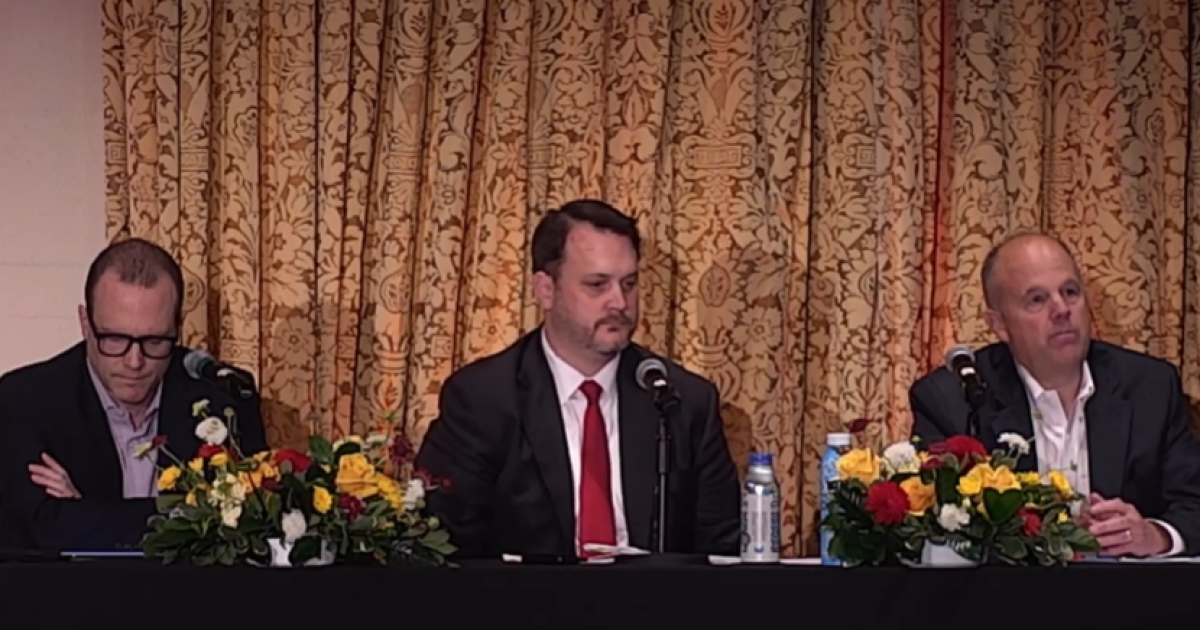Accounting
Former IRS commissioners warn of tax season delays
Published
4 months agoon


A group of former commissioners at the Internal Revenue Service is sounding the alarm about the thousands of layoffs at the agency in the midst of tax season.
Last week, the IRS
“I think it’s clear that, to any rational analysis, this makes no sense at all,” said John Koskinen, who was IRS commissioner from 2013-2017, in an interview with Accounting Today.
The IRS spent a year or more training probationary employees, who were hired after the IRS received more funding under the Inflation Reduction Act of 2022.
“A lot of these people have been there a year to two years, and are revenue agents and revenue officers, but also customer service,” said Koskinen. “And after a year of training with senior IRS people, they are now doing productive work on both customer service and filing. They can do more standard work, so the more senior people can handle a more complicated issue. So when you wipe them out, the more senior people then have to fill the gaps to the extent they can.”
Another former IRS commissioner, Chuck Rettig, who headed the agency from 2018-2022, pointed out in an email to Accounting Today that many IRS employees are military veterans.
“Almost 10% of current IRS employees (including ‘on probation’ new hires) are military veterans, more are proud members of the military reserves, many have volunteered to be deployed to war zones in defense of our country, numerous others are proud military families of active duty military personnel,” he wrote. “Many IRS filing season employees are spouses of current military personnel. A blanket reduction in force will disproportionally harm those who serve or have served our country and supported our military. I’m not advocating that every IRS employee remain in their current position, but IRS employees can be reskilled to help the IRS and taxpayers where such assistance is most needed.”
President Trump
“If they redesignate people away from investigatory activity to support the border, that will most certainly have an impact on the operations of the agency,” said Mark Everson, who was IRS commissioner from 2003-2007 and is currently vice chairman of tax consulting firm Alliant, in an interview late last month.
Koskinen, Rettig and Everson were among seven former IRS commissioners, along with Lawrence Gibbs, Fred T. Goldberg Jr., Charles Rossotti and Danny Werfel, who co-authored a
“If you were to ask the top chief executives in the world to name the best strategy to attack waste in their organizations and balance the books, there is one answer you would be very, very unlikely to hear: Take an ax to accounts receivable, the part of an organization responsible for collecting revenue,” the former commissioners wrote. “Yet the private sector leaders advising President Trump on ways to increase government efficiency are deploying this exact approach by targeting the Internal Revenue Service, which collects virtually all the receipts of the U.S. government — our nation’s accounts receivable division.”
Koskinen made a similar point. “I think it’s a high risk with limited rewards,” he told Accounting Today. “And the irony is this is an administration that claims to be worried about the deficit and claims to be looking for $2 trillion in savings. And it seems to be nonsensical to think that one good way to do that is to hamstring your revenue arm, your accounts receivable division.”
He spent 20 years in the private sector working on turning around failed companies. “The last thing we ever did was say, well, let’s deny funds to our revenue side, to the accounts receivable, and see how we do,” said Koskinen. “Our whole goal was to protect revenues and grow them, and so you protected accounts receivable, you protected sales. You wanted things to succeed and expand. To think that you’re going to help solve the deficit problem by collecting less revenue, I don’t know any business who thinks that’s the way to go. So I’m a little bit in disbelief with the timing and theory behind it. It just seems to me the net result of this is going to be fewer revenues are going to be collected than they would have otherwise.”
Tax season impact
He also believes the layoffs will have an impact on tax season. “What those new people do is free up the more experienced people who spend time training them to continue to pursue both improved taxpayer service and improved revenue collection,” said Koskinen. “It’s really going to hamstring the agency, and that’s assuming it doesn’t screw up the filing season. It just seems to me that this, together with the idea that people are going to go barefoot through the complicated systems in the middle of filing season, they just think that people don’t understand at all how the process at the IRS works and how important it is.”
He expects wait times to increase once again this tax season for taxpayers calling the IRS by phone for assistance after improvements last year. “We’ve gone from not being able to get through or having to wait 30 or 45 minutes to last year during the filing season you could get through in less than five minutes if you had a question,” said Koskinen. “And a chunk of those employees were brought in to expand the number of people answering the phones. I said at the time, it’s a no brainer. You want to improve phone service? Hire more people to answer the phones and train them. So a lot of these people have been hired over the last couple years and trained about answering the phones and answering the questions and being able to be helpful. And so when they disappear, it is not as if everybody else can answer phones faster. The phone service is going to decline.”
Approximately 3,500 of the layoffs are reportedly occurring in the Small Business/Self-Employed Division of the IRS, but the impact may go even further. “With the initial focus on terminating Small Business/Self-Employed Division (SBSE) probationary employees (generally, those hired within the past year), there should not be a significant impact on current filing season operations (which are managed by the Wage & Investment Division),” said Rettig. “Most SBSE examiners hired within the past year have likely been in training for much of that time which implies, there will not be much impact on current, open examinations. Much of that training is conducted by experienced examiners and IRS Counsel, who will now return to the field to assist in current examinations and ongoing litigation.”
Koskinen believes the impact will go beyond the Small Business unit, although he acknowledges improvements could be made. “Now, to the extent that some of this is in the Small Business division, they think they’re getting just people dealing with compliance, but a lot of those people are involved in customer service as well,” he said. “They’re not all revenue agents. It just appears to me this is being done by people who have no real understanding of how the process works and the risks that they’re taking. It’s not to say that over time, there aren’t things you could do to improve the operation. Hiring generally takes too long. The procurement system is too complicated, but a lot of private sector companies love that because they understand and they participate in the procurement system, because they know how it works, but you could smooth a lot of that out and speed it up. So I’m not saying you don’t need to improve operations. I’m just saying that firing a lot of people and disrupting the financing isn’t a really good way to go.”
Technology impact
The cutbacks could set back improvements in IRS technology that help with spotting tax evasion and noncompliance. “There will be a significant impact on the ability of the IRS to expand the volume of examinations going forward,” said Rettig. “However, the IRS is in a better position to identify potential noncompliance and conduct meaningful issue-focused examinations as a result of many important technological enhancements that have been implemented over the past five years. The IRS can now identify issues of noncompliance that would not have been remotely possible just a few years ago.”
The IRS has begun using artificial intelligence to detect tax cheats, but it still needs to rely on human beings to examine the returns.
“Fundamental technology upgrades and the onboarding of sophisticated data scientists have significantly enhanced internal and external IRS operating systems,” said Rettig. “The use of AI combined with enhanced Service-wide technology enhancements has greatly improved the ability of the IRS to select appropriate cases for examination and has greatly accelerated the pace of these examinations. However, these upgrades have not kept pace with ever-increasing responsibilities and challenges facing the IRS. Technology helps define the path forward but the ultimate resolution of an issue typically requires an experienced person to be involved. The IRS still needs specialized examiners and related resources to actually conduct examinations and determine deficiencies, as well as others to represent the IRS in administrative appeals and possibly litigation. All of these folks need constant training, and the more experience, the better for both the IRS and the taxpayer.”
The IRS will lose many of the employees it has spent the past few years training on its technology. “It’s one thing to say you’re a probationary employee, but in IT where they’ve been hiring people again, trying to improve the systems, you may have only been there a year or two, but you get hired because you’re an expert, because you know how to deal with all this,” said Koskinen.
The IRS has been able to use the extra funding it gained in recent years to improve its array of digital tools for taxpayers.
“Regarding taxpayer services, the IRS has launched more digital tools in the last two years than in the previous 20 years, including more than two dozen new features and enhancements to individual and tax professional online accounts; the launch of a business tax account; the release of 30 digital mobile-adaptive forms; the ability for taxpayers to receive their refund status via a conversational hotline; a mobile-friendly web tool for Where’s My Refund; and Direct File, which allows taxpayers to file directly with the IRS for free,” said Rettig. “On the horizon, enhanced IRS digital self-service options will provide a private-sector-like experience, allowing taxpayers to interact almost entirely from their mobile phones, in the language most convenient for the taxpayer.”
Cybersecurity and privacy issues
The layoffs could affect the cybersecurity of the IRS’s confidential taxpayer data, which is constantly under attack. “The IT people spend a lot of time not only making sure the systems run, but protecting the systems from cyber criminals,” said Koskinen. “Originally I was told we got pinged a million times a day, and it finally got to 4 million times a day. These are organized crime syndicates around the world. When I started, we were sending almost $6 billion a year in false refunds to criminals everywhere.”
The Security Summit partnership that the IRS started with the tax prep industry and state tax authorities while Koskinen was commissioner managed to reduce that amount of fraud, but it may be at risk now due to the layoffs.
“We did a partnership with the private sector and state tax authorities, and I think it’s under a billion now,” he said. “We cut the number of taxpayers adversely affected because somebody had already filed on their behalf by close to 90% now, but that was all because we got much quicker on our feet. That means there are still criminals out there trying to figure out how to defeat the whole system. So it’s not simple. A lot of work has gone into trying to make it as smooth and efficient as possible, and these actions are just totally contrary to those desires.”
The staffing reductions may now encourage fraudsters and identity thieves to cheat on their taxes or steal other people’s tax refunds.
“If you thought that suddenly the IRS is starting to be underfunded again, maybe there’s a good chance that they’re not going to be as quick on their feet as they used to be,” said Koskinen. “They’re literally pinging it millions of times a day. They’re continually trying to reverse engineer what stops, what gets through? If something gets through, that’s what they’ll do. We’ll send you more of those, because they’re very thoughtful and careful not to apply for huge refunds. They apply for a $3,000 refund or $4,000 or $1,500, but they apply for hundreds of thousands of them. They’re always looking for where the weakness is in the system, where they can get in and file for a $2,500 refund and get it done before [the legitimate taxpayer] files.”
Taxpayer privacy could be affected by the cuts. “You need to be exceptionally careful on data analytics and artificial intelligence for two reasons,” said Everson. “One, they’ve got to make sure that they maintain taxpayer privacy. And two, the rules that get embedded in these kinds of exercises can’t have some unintended consequence, and the degree to which they’re going to be relatively more thinly manned, if that’s what happens, then you can get people who aren’t looking at what the contractors are doing, or aren’t very clear on what the rules are delivering. So I do think that this task of deploying the technology gets harder in this environment.”
The IRS also worked to disrupt cybercriminals during Rettig’s term. “During my term as Commissioner (2018-2022), the IRS-CI Cyber Unit significantly disrupted Dark Web terrorist financing arrangements for Hamas, al Qaeda and ISIS, disrupted international child exploitation sites operating in the Dark Web, disrupted financial transactions involving international drug cartels, located concealed assets of sanctioned Russian Oligarchs and performed the largest digital asset financial seizure ($3.6 billion) in our country’s history,” said Rettig.
The reports that Elon Musk’s Department of Government Efficiency team has been able to access sensitive taxpayer data has also
“One of the things the agency feels most strongly about is protecting that data,” said Koskinen. “Employees can’t look at anybody’s return unless they have a clear reason to do so. I never saw anybody’s tax return.”
He acknowledged that some researchers can get access for specific purposes. “A lot of researchers do statistical analysis, which is helpful to the IRS,” said Koskinen.
The Biden administration also set its priorities for the IRS, Everson pointed out.
“What happened in the Biden administration is they made a policy pronouncement to go after the individuals that they felt had income of over $400,000, the higher-income individuals and large corporations,” said Everson. “Not all the research had been updated as to where the tax gap problem is. What I hope is that they take a complete, comprehensive update through the research arm on where the work should be done, and then redevelop the enforcement model. I’m not suggesting that they’re going to back away from everything, but I do think that focusing on those two areas is likely to be much diminished from where it was, in part because there won’t be the extra people coming on board because of the Republican majority view that they don’t want more enforcement. And also, in the world of partnerships, in the higher income or the corporations, it takes a great deal of training and experience before you’re effective. I just don’t think those people will be there.”
Tax refund delays
There is also a danger of delaying tax refunds, which will mean more angst for taxpayers.
“Over 70% of people get refunds, and so if you interfere with that, they’re not going to be pleased if you slow it down,” said Koskinen. “The agency spends a phenomenal amount of time focused on trying to make sure the highest priority is everybody’s treated fairly, the filing season goes smoothly, and people get answers to the questions they have that they need to make sure they’re filing returns correctly, and all of this is now disrupting that.”
Tax professionals will likely be fielding anxious questions from their clients, and the staffing cuts could mean the Practitioner Priority Service won’t be much help.
“In the bad old days, when customer service just declined because of the significant budget cuts, the Practitioner Priority line was an oxymoron,” said Koskinen, who heard complaints about it during a session with the American Institute of CPAs. “You can’t get through on the Practitioner Priority line any faster than if you’re just the public, because you have to have somebody there to answer the phone who knows what they’re doing.”
Staffing cutbacks would compound the problems with employees leaving the IRS due to retirement. “A lack of important staffing and funding may well impact the volume of examinations the IRS can conduct, but those selected for an examination will understand that a traditional tax examination by a modernized agency in a target-rich environment does not represent a significant challenge,” said Rettig.
“A high rate of attrition coupled with an aging workforce and a general hiring freeze from 2011 to 2018 is a significant concern in trying to determine the appropriate level of experienced staffing going forward. The current hiring freeze and terminations of probationary employees will serve to exacerbate these concerns. In the federal government system, it has historically been extremely difficult to compete with the private sector for top talent. Further, the recruitment, onboarding and training programs are somewhat cumbersome, at best. Most IRS employees come onboard with a sense of dedication to serving our country. It remains to be seen how current events might impact that dedication going forward.”
New IRS commissioner
The next IRS commissioner will have to decide what to do with the diminished staff and budget. Trump’s decision to
“There’s no paying much attention to precedent here,” said Koskinen. “Twenty-five years ago, Congress passed a statute for the first time, and the IRS commissioner was given a five-year term for two reasons. One is to encourage commissioners to stay longer than the usual two years or two and a half years for political appointees, so people would sign up for five. And the other reason was to take it out of politics to the extent you could.”
He noted that ever since 1998, every commissioner has been permitted to finish their term, even though some of it often lasted until the next administration. “It was just designed to make sure that people understood these are not political jobs in the formal sense,” said Koskinen.
The job of commissioner has traditionally been assigned to someone with management experience in running a large organization.
“This is the first time that a commissioner has not been allowed to finish,” said Koskinen. “And it’s an unfortunate precedent, because now, when you appoint a commissioner, the assumption will be you’re only going to be there for this president’s term.”
Congress may need to step in to safeguard the IRS and provide oversight. “Given the voluntary compliance nature of our system of taxation, Congress should start helping the IRS earn the trust and respect of the American people rather than attack it for political gain,” said Rettig. “For decades, the IRS has welcomed Congressional oversight at any level or degree desired.”
You may like


The Securities and Exchange Commission is already making plans in the event that the massive tax bill now moving through Congress ends up shifting the Public Company Accounting Oversight Board’s duties to the SEC.
In late May, the House
“I guess as an initial matter, certainly, we are aware of the proposed legislation that is both in the House and the Senate as part of the budget reconciliation bill,” said SEC acting chief accountant Ryan Wolfe during Financial Executives International’s SEC and Financial Reporting Conference at the University of Southern California’s Leventhal School of Accounting. “I think from the staff perspective, where we’re assisting the Commission, it’s important that we are thinking about these issues, are monitoring and are prepared as the potential for these bills to move forward would result in the Commission having new statutory responsibilities. Specifically with respect to standard-setting and inspections, the enforcement authorities would also transfer, but we already have shared jurisdiction with respect to those activities.”
He noted that the SEC has been hearing a great deal of feedback about it across the spectrum.
“I would observe that one thing that I hear, I don’t want to say universally, but quite consistently, is the importance or the overall ecosystem of the three major programs that the PCAOB engages in, being standard-setting for auditors, inspections of auditors to evaluate the compliance with those standards, and similarly, the enforcement function,” said Wolfe. “And so I think that these are incredibly important objectives that will continue regardless, which is just to say, without providing any significant details, that we’re aware of it and we are working on those issues.”
On the other hand, the SEC’s Office of Chief Accountant is prepared in case the provision gets dropped from the final bill.
“But in the event that that would not go forward, the OCA’s assistance with the Commission and the oversight of the PCAOB will continue regardless,” said Wolfe.
He also pointed to the importance of continuing standards such as the
Panel moderator Mark Kronforst, a partner at Ernst & Young, pointed out that SEC chair Paul Atkins said during a recent congressional hearing that despite a recent 15% reduction in staff at the SEC, there would still be room in the budget for the PCAOB under the legislation.
Another SEC official also acknowledged the recent reduction in the staff during a later panel discussion.
“Certainly, there has been a reduction in the federal workforce and the Commission, the SEC, has been no exception to that,” said Gaurav Hiranandani, acting deputy chief accountants at the SEC. “Many of the talented staff at the Commission have decided to retire or have sought opportunities outside of the commission. Within OCA, we have also seen some talent depart, some longstanding staff.” He noted that some of the speakers at last year’s conference are among those who left.
Financial Accounting Standards Board chair Richard Jones also spoke at the conference and discussed the progress that FASB has been making on its standard-setting.
“A couple years ago, we comprehensively reset our agenda,” he said. “We did robust stakeholder output to really ask an open-ended question of what should be the FASB’s priority, and what you’ve seen over the last couple of years is us executing on that revised agenda. If you pull up our technical agenda today, you’ll see there are 12 projects on our technical agenda. Of those 12 projects, five of those have been voted out by our board to proceed to final standards. Five of those are in redeliberations, meaning that we’ve already issued an exposure draft, we’ve gotten great input from our stakeholders, and our board will be redeliberating to decide what direction to go forward on those standards. We voted to move forward with an exposure draft on another standard, so that’s 11 of the 12. If you follow those through, and you follow a plan of execution on those standards, it’s very reasonable that we could complete substantially all the projects on our agenda at or about the end of this year.”
Accounting
Optimism declines among accountants | Accounting Today
Published
10 hours agoon
June 11, 2025
U.S. accountants who advise small and midsized businesses are feeling less confident this year, according to a new survey.
The
Between January and April, the net sentiment among accountants swung from a positive 19% to a negative 39%. Initially, nearly half (47%) of advisors foresaw improving conditions. But by April, only 25% held this view, with nearly two-thirds (64%) expecting worsening economic environments. The shift signifies growing apprehension across Main Street accounting firms serving as advisors on tax, payroll and compliance decisions amid a backdrop of historic tariff actions, continued inflation and unpredictable tax and trade policies.
Accounting advisors pointed to the top issues impacting their clients, with 61% citing inflation, costs and pricing; 60% naming tariffs and trade impacts and uncertainty; 59% pinpointing unease around new tax legislation; 42% identifying ongoing labor supply and wage issues; and 37% citing technology and AI adoption as a priority.

“Accountants are sounding an urgent alarm,” said CPA Trendlines founder Rick Telberg in a statement Wednesday. “They’re advising SMBs to conserve cash, curb discretionary expenses, and resist taking on unnecessary debt. Amid volatility in tariffs, inflation, and complex tax legislation, SMBs face serious barriers to strategic growth and operational stability.”
According to the accountants polled, the biggest challenges facing SMBs are hiring and retaining talent (60%), keeping pace with technology (55%), and managing rising costs (52%). The added strain of tariffs has handicapped SMBs’ adaptability and agility, which is typically their key advantage over larger competitors.
Other challenges include adapting to disruption (35%), meeting evolving customer expectations (32%), and managing product costs (29%).
Accountants feel the most confidence in their professional services sector — including doctors, lawyers and other professionals — with 60% believing this sector will thrive during a downturn. Not far behind that is the technology sector, where 57% of accountants expressed confidence driven by strong demand for digital solutions and AI that boost operational efficiency and resilience. And the oil, energy and mining sectors show 39% of respondents optimistic due to recent spikes in supply and demand for these resources.
On the other hand, farming (6%), franchising (3%), and arts and entertainment (2%) are seen as the most vulnerable sectors. These sectors depend heavily on broader economic performance, and the recent tariffs have further strained their growth and output.
Firms are encouraging clients to monitor their burn rates, cut overhead and avoid unnecessary borrowing. AI and automation are also important as survival tools amid labor shortages and pricing pressure.
“This year’s survey underscores a critical moment for the SMB business sector,” said Sona Akmakjian, head of global strategic accountant partnerships at Avalara, in a statement. “Accountants are urging businesses to fortify themselves against ongoing economic turbulence by sharpening their operational focus, adopting intelligent technology, and carefully managing resources. Clients are, more than ever, relying on the accretive business acumen and advisory skills of their trusted advisor for guidance through historic headwinds and uncertainty.”
The 2025 Accountants Confidence Report
Accounting
Republican senators consider $30K SALT cap in Trump tax bill
Published
10 hours agoon
June 11, 2025

Republican senators are considering placing a $30,000 cap on the state and local tax deduction as a compromise between current law and the more generous limit in the House’s version of President Donald Trump’s tax bill, a key GOP negotiator said.
Senator Thom Tillis, a moderate Republican involved in the talks, said Republican senators are trying to reduce the House-passed $40,000 SALT limit to at least $30,000.
Republican senators are meeting behind closed doors Wednesday afternoon to discuss the details of the bill, which the Senate is aiming to pass later this month.
SALT was a core issue in the House, where Republicans from high-tax states like New York, New Jersey and California threatened to block the bill without a substantial increase to the current $10,000 SALT cap.
House Speaker Mike Johnson has warned senators to make as few changes as possible to the House’s SALT deal. But SALT isn’t a concern in the Senate, where there are no Republicans representing states where the deduction is a political priority.
“It’s hard because we don’t have any senators from SALT states,” said Republican Senator Markwayne Mullin. “We are searching for a compromise.”
Mullin said he has already spoken on the issue with New York Republican Mike Lawler, a key proponent of the increased SALT cap.

Trade tensions not stopping Chinese companies from pushing into U.S.

SEC plans ahead for PCAOB takeover

Optimism declines among accountants | Accounting Today

New 2023 K-1 instructions stir the CAMT pot for partnerships and corporations

The Essential Practice of Bank and Credit Card Statement Reconciliation

Are American progressives making themselves sad?
Trending
-

 Personal Finance1 week ago
Personal Finance1 week agoWhat the national debt, deficit mean for your money
-

 Economics1 week ago
Economics1 week agoPeople cooking at home at highest level since Covid, Campbell’s says
-

 Economics6 days ago
Economics6 days agoJobs report May 2025:
-

 Economics1 week ago
Economics1 week agoElon Musk’s failure in government
-

 Economics6 days ago
Economics6 days agoDonald Trump has many ways to hurt Elon Musk
-

 Economics6 days ago
Economics6 days agoDonald Trump has many ways to hurt Elon Musk
-

 Economics4 days ago
Economics4 days agoSending the National Guard to LA is not about stopping rioting
-

 Finance6 days ago
Finance6 days agoStocks making the biggest moves midday: WOOF, TSLA, CRCL, LULU
